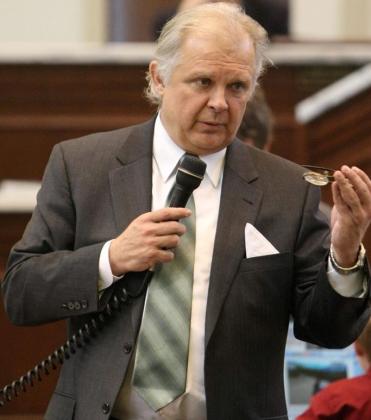OKLAHOMA CITY — Former state Rep. Richard Morrissette has to bite his tongue to refrain from saying, “I told you so.”
A bill advancing through the Legislature this year proposes a pilot program to stamp out the pesky eastern redcedar tree. Morrissette, who represented a district in south Oklahoma City, began more than a decade ago to warn his colleagues in the Legislature about the hazards posed by the invasive juniper.
It started with his Eastern Redcedar Initiative Act of 2010, signed into law by Gov. Brad Henry.
That measure was intended to create a registry that would include the location, ownership, level of infestation and average size of eastern redcedar trees; encourage the harvesting of the evergreen trees; and promote marketing, research and education efforts about the tree and products derived from it. For example, the bill stipulated that the term ‘biofuels’ “shall include fuels derived from cedar tree residue and cedar tree products.”
“The whole tree can be used for making furniture, oil, mulch and lumber,” Morrissette told Southwest Ledger. “And eradicating the tree clears land for growing crops, for wildlife, and for pasture where livestock can graze.”
The next year Morrissette introduced the Woody Biomass Energy Initiative Act of 2011.
The eastern redcedar is “encroaching upon ecosystems outside of its historic habitat, costing the state an average of $412 million annually in loss of water, grazing lands and wildlife habitat, fire loss and allergic illness,” House Bill 1486 lamented. The objectives of the Eastern Redcedar Registry Board are “to assist state and private land owners with the control of the eastern redcedar tree and to use the removed trees as fuel…”
Harvested woody biomass “can be produced for use as chips, pellets and other forms which have energy values higher than all traditional fuel sources, with eastern redcedar having a considerably higher BTU value.”
HB 1486 passed both the House of Representatives and the Senate but was vetoed by Gov. Mary Fallin.
In 2012 Morrissette filed House Bill 2695, the Oklahoma Resource Reclamation Act.
The bill reported that 19 counties reported a loss of use of “somewhere between eight million and ten million acres” because of invasive trees, “thereby threatening the $28 billion Oklahoma agricultural industry.”
It was in the public interest that private, unoccupied lands “be managed to discourage the proliferation of wildfires, reduce and control the infestation of eastern redcedar trees, and modify the growth of all trees, vegetation and other fuel sources from areas within 100 feet of homes or other structures…”
The bill would have required private absentee landowners to control infestation to reduce threat of wildfires and remove eastern redcedar trees if the property were overrun with the trees. An infestation was defined as acreage where “eastern redcedar trees, other tree species, vegetation and other fuel sources cover 80% or more of the total land area.”
HB 2695 would have allowed prisoners to harvest eastern redcedar trees and authorized a tax credit for qualifying farmers and ranchers who removed eastern redcedar trees from their land. The bill passed the House but died in the Senate Agriculture and Rural Development Committee.
In September 2012 Morrissette hosted an interim legislative study on how to effectively harvest eastern redcedar trees.
Morrissette reintroduced the Resource Reclamation Act measure in 2013, but it died in the House.
So did his House Bill 1656, also introduced in 2013, which would have developed “a renewable woody biomass energy usage plan that will include appropriate harvesting and fuel-burning guidelines and techniques for the use of biomass for energy production.”
In House Bill 2900 filed in 2014, Morrissette proposed moving the Redcedar Registry Board from the Board of Agriculture to the State Commerce Department and allowing up to 300,00 acres each year to qualify for a tax break. That proposal died in the Senate Appropriations Committee.
A measure he filed in 2015, House Bill 1076, would have created a program in which state prisoners could “earn the right to access specific future educational and training certifications” by participating in “the harvest of Juniperus Virginiana, commonly known as the eastern redcedar, and other cedar species which have been deemed by the Oklahoma Department of Agriculture, Food, and Forestry as invasive or posing a potential threat to human health or community natural resources and are in need of control.”
That bill died in the House without receiving a floor vote.
Also in 2015 Morrissette filed House Bill 1075, which would have moved administration of the Eastern Redcedar Registry Act from the Department of Agriculture to the state Department of Environmental Quality.
The bill also would have allowed an owner of property infested with the eastern redcedar to apply for reclassification of that acreage as timber waste “or the lowest classification category allowed in the county.” Upon removal of the trees, the owner would be eligible for a one-time tax concession based on the number of infested acres cleared. The total number of acres of land approved for the tax break would have been limited to 1,000 per landowner.
HB 1075 passed the House in a split vote but died in a Senate committee.
And in 2016 Morrissette filed House Bill 2748, which would have created the Oklahoma Resource Reclamation Act “to manage natural resources, specifically when threatened by eastern redcedar infestations” The House passed the bill, but the Senate Rules Committee killed it.


